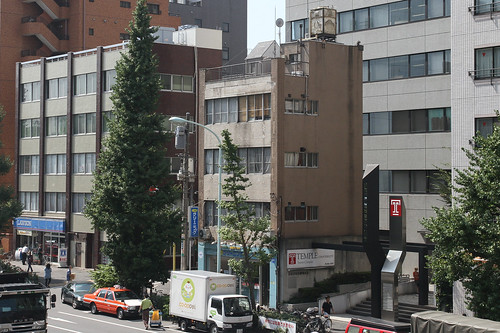With the yen rising in value, Temple Japan students can’t live the way they used to.
TOKYO – For many students, studying abroad is a dream, and with Temple’s abroad campuses, such as Temple Japan, students have a great chance to embark on a once-in-a-lifetime adventure.

However, the current economic troubles have meant that the once quite-affordable semester in Tokyo has become rather expensive, as exchange rates have plummeted.
Three years ago, the Japanese yen was at 121 per dollar, which meant that, in spite of Tokyo being one of the most expensive cities in the world and Temple Japan being in one of the most expensive parts of Tokyo, many students could comfortably travel to Japan for a semester or even all fours years of their college career.
This month, however, the yen reached a 15-year high versus the dollar, reaching 83 yen per dollar in the midst of America’s recession. This is a staggering 32 percent change in value of the dollar in Japan.
The effect has been particularly devastating to Americans who attend Temple Japan for extended periods of time. Even though full-time American students pay tuition in yen, students’ financial aid still comes from the United States in dollars.
“I live off financial aid. When it’s converted into yen it becomes a lot less. I lose about a thousand dollars,” said Michelle Branch, a junior art major at Temple Japan. “All my money mainly comes from the [United States].”
Branch has trouble making rent, and her cell phone was turned off due to missed bills. She’s not alone at Temple Japan’s campus in being pinched by the exchange rate. She said one of her friends should have seen a $700 to $1,000 financial aid refund this semester but instead owes the school money.
Since most students aren’t fluent in Japanese until later in their educations, getting a part-time job isn’t usually an option. Many jobs available to non-Japanese speaking foreigners require students to work during the day when class is in session, such as modeling or acting as a TV-show extra. Students can also work language-teaching jobs, which frequently pay employees under the table.
Since students must have a work permit to get a job, applying to and working for establishments under the table puts their visas at risk. In addition, Temple Japan will not approve a work permit for anything perceived to be in an adult industry.
As word gets out in the U.S. about the exchange rate, fewer students will likely be applying for programs in Japan in the future.
For now, it’s difficult to analyze any trends in admittance. In the last five years, the study abroad enrollment – including undergraduates, law students and the International MBA program students but not counting full-time students – at Temple Japan has been steadily decreasing.
“To see what impact the current exchange rate will have, and assuming that rates will stay near where they are, we will need to look at future semesters, perhaps next year,” said Maureen Gordon, the university study abroad coordinator.
Despite decreasing enrollment numbers since the fall of the dollar, she said nothing can be attributed to the exchange rate alone, as many major changes have been made to the courses offered at Temple Japan during that time.
Gordon said she believes that if the dollar continues to decline against the yen, its significance in affecting people’s decision to attend Temple Japan could increase until people get used to a strong yen.
The Japanese government recognizes the problems a strong yen causes for the Japanese economy. While a strong currency is good, Japan’s industry relies on exporting its products to the world and building a strong tourist economy.
If the world can no longer afford to buy Japan’s products or travel to Japan, this would devastate a nation that still not fully recovered from the economic collapse that led for the 1990s to be referred to as “The Lost Decade.”
Starting two weeks ago, the central bank of Japan began selling yen and buying U.S. dollars in an attempt to weaken the yen. So far, the decline has been halted, with the yen briefly falling to nearly 86 yen to a dollar.
Time will tell if Japan can successfully and safely devalue the yen. One thing is for certain – it will probably be a long time, if ever, before studying in Tokyo is as affordable as it once was.
Lee Miller can be reached at lee.miller0001@temple.edu.



Awesome blog, Thank you!!!
Thank you… I was making plans to go abroad to study in Japan.. but it seems i am out of luck